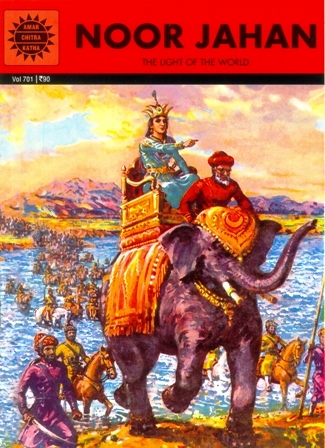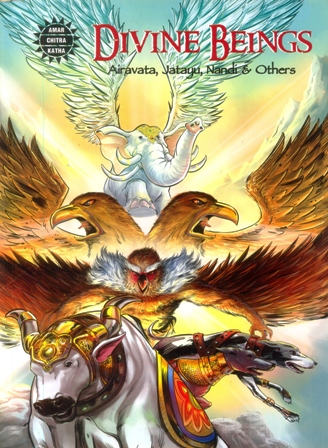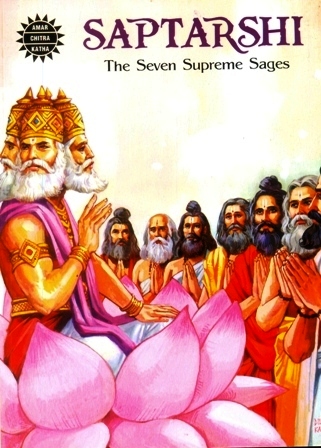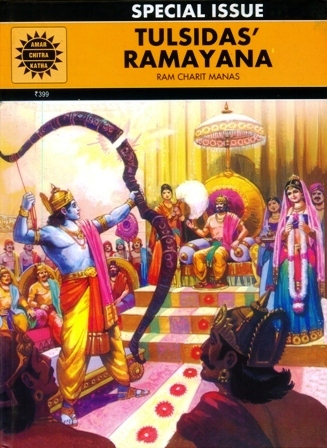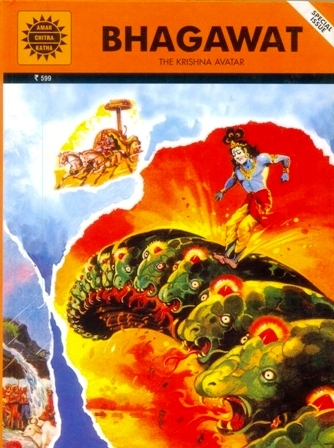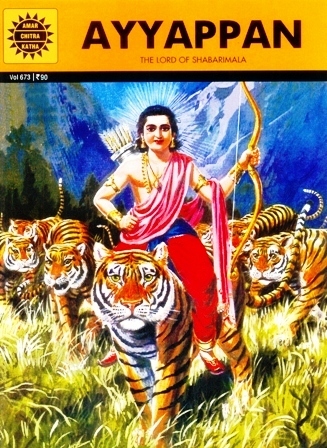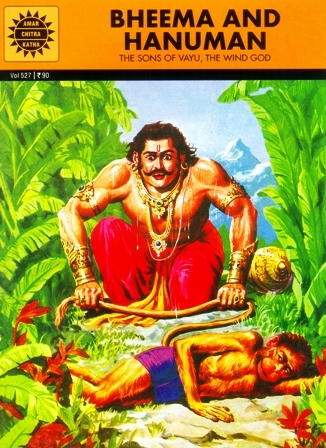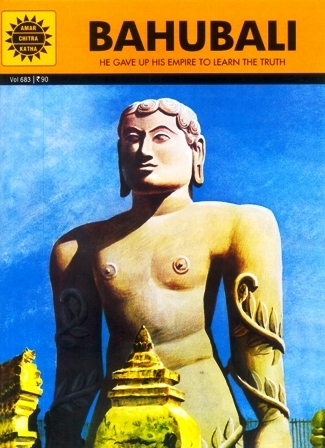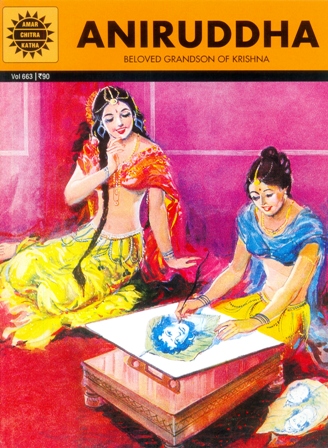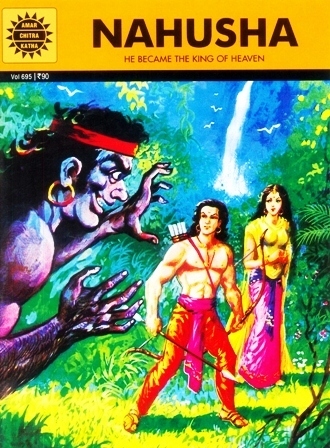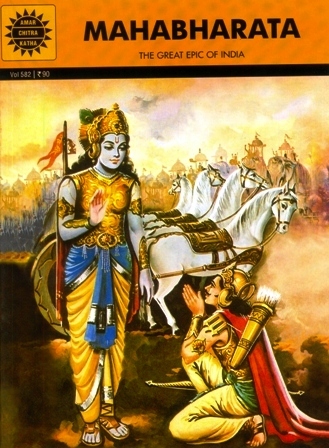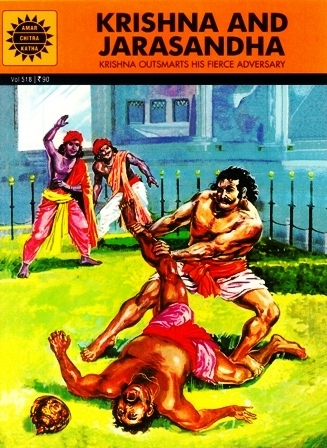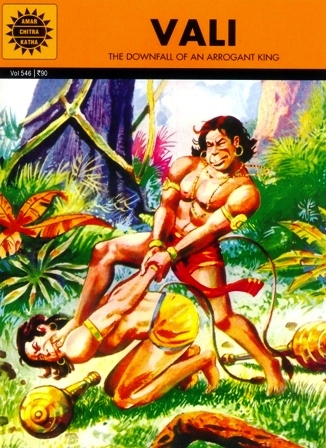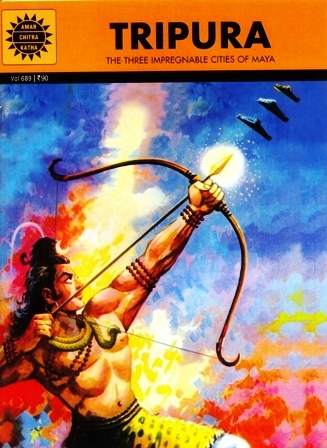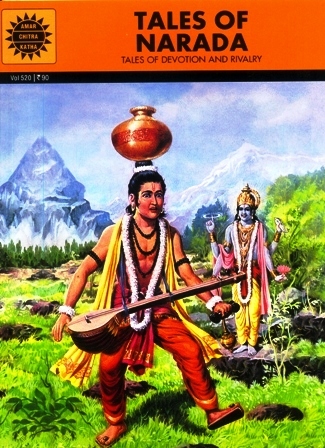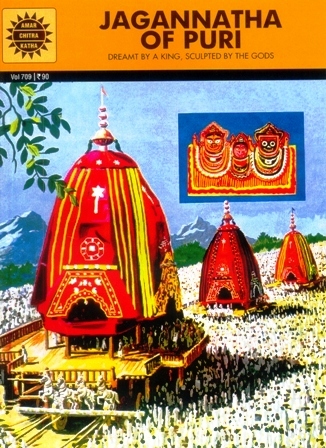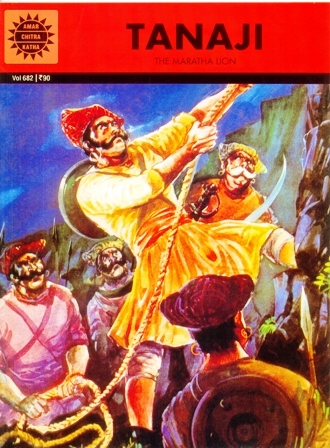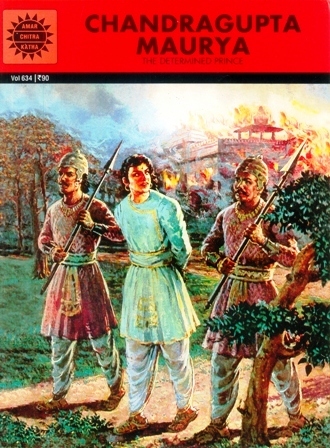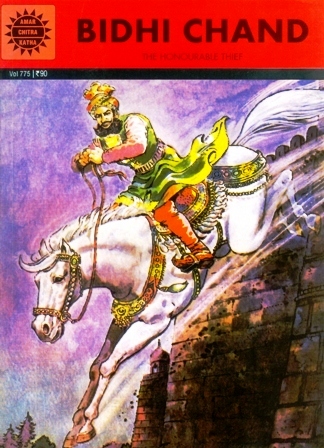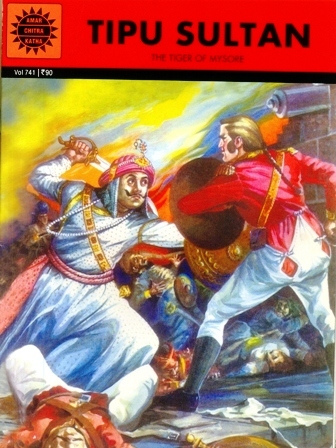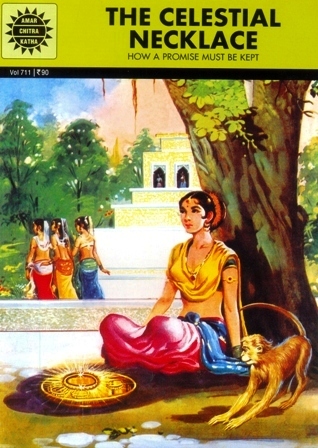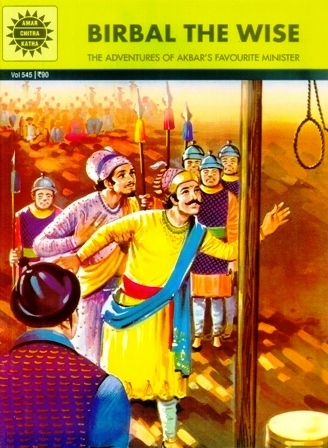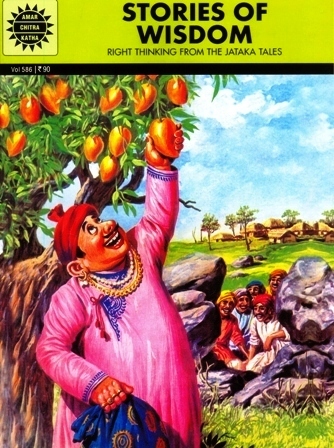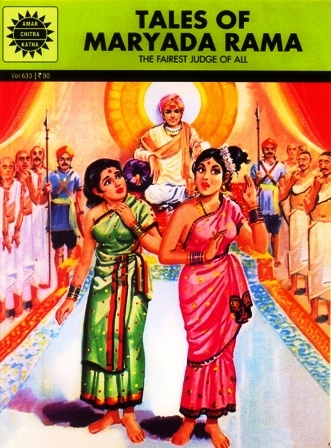-
Noor Jahan
Born a poor refugee, Meher was blessed with both spirit and talent. She could ride horseback and design fine clothes. She could lead armies to victory and yet be a doting wife. She could attend to the problems of a vast empire and at the same time be blissfully happy making perfumes. Emperor Jahangir fell under her spell and aptly named her Noor Jahan, for she lit up his world with her love.
-
Divine Beings
As Ravana abducts Sita, the brave vulture Jatayu sacrifices his life trying to save her. With his unparalleled devotion, Nandi gains immortality as Shiva's vahana. The magnificent fourtusked elephant, Airavata emerges from the golden egg of creation to become Indra's trusted vehicle. When Vishnu as Narasimha continues to destroy the world, he takes the form of the twoheaded bird, Gandaberunda. Shyama and Sabala, the divine hounds are given the responsible task of guarding Yama's gates. The stories in this Amar Chitra Katha are taken from ancient texts including the Shiva Purana, Vishnu Purana, Gajashastra, the Brahmanas and also from folklore.
-
Saptarshi - the Seven Supreme Sages
In Indian mythology the concept of time is measured in a manavantara. In each manavantara Brahma creates seven exceptional sages from his mind, who represent supreme knowledge and righteousness. It is their duty to see that law and order is maintained in the Universe. We live in the Vaivasvata Manavantara. Amar Chitra Katha has captured stories from the inspiring and remarkable lives of the seven sages chosen to represent the current manavantara. Atri was known for his honesty and for his devotion. He was married to Anasuya who was a very pious woman and capable of great deeds. Atri's life spanned many yugas. He played a role in the events of the Ramayana as well as the Mahabharata. Vasishtha was the voice of wisdom and honesty. He was the kulguru to the Solar Dynasty and tutored Rama and his brothers. Kashyapa is considered the father of all living beings. Brahma gave him the task of creating life for swargaloka, bhooloka and patal-loka.The origin of all creatures can be traced back to Kashyapa and his wives. the proud King Kaushika had a troubled relationship with Sage Vasishtha. He wanted to become a Brahmarshi just like him. the story tells of his transformation into the accomplished sage, Vishwamitra. Gautama and his wife, Ahalya, overcame the mistrust and insults of the people of Brahmagiri and brought Ganga to the parched land. Jamadagni, who was a proficient student of the Vedas, was chosen by Vishnu to be his father during his avatar as Parashurama. Bharadwaja's thirst for knowledge was so great that he prayed to Indra for a long life so he had enough time to learn. With Indra's blessing he spread the knowledge he had learnt, around the world. the seven sages are said to reside in the heavens as stars of the Saptarshi Mandal.
-
Tulsidas' Ramayana: Ram Charit Manas
Tulsidas (1574) tells the story of Ram, the prince of Ayodhya, in Awadhi, a dialect of Hindi spoken in Awadh in Uttar Pradesh. The work consists of about a thousand stanzas, each about 12 to 18 lines, set in elegant rhyme. Every village and town in the Hindi heartland has a troupe that gives a theatrical performance, called Ramlila, based on Tulsidas' work. Ramlila is enacted as part of the Vijaya Dashami celebrations.
-
Bhagawat:The Krishna Avatar
The Bhagawat Purana tells of the ten incarnations of Vishnu and is the most popular of the Puranas. This Special Issue describes the events of the tenth canto which narrates the life of the most beloved god in Hindu mythology - Krishna. Beginning with the miraculous birth of Krishna, the story traces his childhood exploits, including the slaying of dangerous demons and the performing of miraculous acts. The comic also describes Krishna’s battle with Kamsa as he retrieves the kingdom of Mathura for his aging grandfather, Ugrasena.. In the Bhagawat, Krishna is seen as a son, brother, husband, friend and warrior.
-
Ayyappan
With Shiva and Vishnu as parents, a child's life is bound to be unusual. Ayyappan's courage is unlimited and his wisdom unmatched. Vicious tigresses fall under his spell just as avenging demons succumb to his divine strength. Only power-crazed human beings are foolish enough to try to destroy this extraordinary lad. But, as he ascends to his rightful place as the god of Shabarimala, the glow of Ayyappan's compassion makes even earthly riches lose their glitter.
-
Bheema and Hanuman
Bheema was the strongman of the Pandavas in the Mahabharata. So was Hanuman the ape in the Ramayana. For both, the poets held that their powers were the gift of the wind-god, their parent. The two face each other in this story from the Mahabharata. During the Pandavas' exile in the forest, their wife Draupadi expresses her wish to have a particular flower. Bheema sets out for the mountain on which the flower blossoms. On the way he demonstrates his strength against an elephant. He is however unable to lift the tail of Hanuman who is lying on the way. An interesting encounter follows and in the end Bheema achieves his purpose. Both are known for their extraordinary strength and valour. Both are the sons of Vayu, the wind God. Hanuman lived in the Tretayug serving Sri rama while Bheema, a contemporary of Krishna, lived in the Dwaparyug. The Mahabharata narrates the story of an encounter between the two mighty brothers.
-
Bahubali....
Bharata, king of Ayodhya, had an overriding ambition to become king of kings. He set about subduing every kingdom possible including those of his brothers. The only person to oppose his arrogance was his half-brother, Bahubali, who defeated Bharata in single combat. However, Bahubali abdicated all claims to the throne and left for the forests to meditate. Centuries later Chavundaraya, a commander-in-chief of the Ganga dynasty built a 57 feet high statue of Bahubali at Shravana Belagola. This story has been taken from Pampa's Adi Purana and Panchabana's Bhujabali Charita.
-
Nahusha
Even though Nahusha, the son of King Ayus and Queen Indumati, was spirited away at birth to be killed by the demon, Hunda, he lived on to achieve immortality. Married to Ashokasundari, the beautiful daughter of Shiva and Parvati, he was elected to be the king of heaven and then his mortal mind succumbed to the sin of pride. The stories of Nahusha are taken from the Padma Purana and the Mahabharata.
-
Mahabharata....
It all began with petty family jealousy. The Kaurava brothers tricked their Pandava cousins out of a kingdom and even Lord Krishna could not stop the horror and bloodshed that followed. Veda Vyasa composed an epic poem, the longest in the world, to describe the events that unfolded. In this epic tale of superhuman heroes and gory action, Veda Vyasa explores human ambitions, relationships and conflicts to find the true purpose of life.
-
Krishna and Jarasandha
The Yadava tribe fled to distant Dwaraka to escape the wrath of the mighty Jarasandha, the ruler of Magadha. This king, whose very name made the strong quake, had to be subdued if the Pandavas were to establish their supremacy in the area. Only their cousin Krishna, a Yadava hero, could help them and this is the tale of his triumph.
-
Vali.
Vali's days were numbered. Brave enough to confront the most vicious of demons and strong enough to destroy them every time, he unfortunately could not conquer his own pride. Foolishly, he turned his adoring brother, Sugreeva, into a mortal enemy and drove him to take the help of that supreme warrior, the mighty Lord Rama.
-
Tripura..
The asuras rejoiced as they played havoc with both men and gods. Maya, their gifted architect, had created for them three cities fortified with iron, silver and gold and the great lord Brahma himself had decreed that these cities would be indestructible, unless struck by a single arrow. The three cities, known together as Tripura, orbited the earth and only once in a thousand years fell in a straight line, directly one above the other. Would Shiva be waiting to destroy them with a twang of his deadly bow?
-
Tales of Narada
Sage Narada symbolizes unqualified devotion to Lord Vishnu, also known as Narayana. He is inseparable from his veena and has the name of Lord Narayana always on his lips. In the Puranic stories, it is Narada who puts the lord's devotees to test. But when he himself is put to test will the celestial sage emerge victorious?
-
Jagannatha of Puri
King Indradyumna of Utkal had only one wish - to be able to build a temple that would be the most beautiful in the world. His quest was for the image of the blue-colored Krishna or Nilamadhav. The king came very close to achieving his goal but his pride and arrogance snatched it away from him leaving him groping once more in the dark. Contained in this Amar Chitra Katha is the legend behind the temple of Jagannathapuri in Orissa and the images enshrined in it.
-
Tanaji...
Tanaji Malasure was only a boy when he took an oath to support his friend, Shivaji, in fighting the Mughals. Along with their small band of faithful followers they became a thorn in the side of the Emperor Aurangzeb as they conquered fort after fort. Tanaji's prowess was tested when he was entrusted with the near impossible task of capturing Kondana Fort. The present story is based on Shivasmruti by G.S. Sardesai and Shivaji the Maratha - His Life and Times by Sir H.G. Rawlinson.
-
Chandragupta Maurya...
Chandragupta Maurya defeated the Nandas and established himself on the throne of Magadha in 321 B.C. It was a journey fraught with dangerous challenges but his chance meeting with the wily Chanakya changed his destiny forever. The clever Brahmin showed him how by the sheer brilliance of his wit and wile he could help the young Mauryan prince to rise from being an unknown warrior to one of the greatest emperors of India.
-
Bidhi Chand
Bidhi Chand was a skilled robber but a meeting with the Sikh Guru, Arjan Dev, changed him. He promised to turn honest, he would tell no lies and never steal again. But then the Mughal Emperor's soldiers forcibly took away two horses belonging to Guru Hargobind, the son of Guru Arjan. The Sikhs did not have the numbers to attack the vast Mughal army. They had to resort to trickery to get the horses back and Bidhi Chand found that he had to go back on his word, just this one time and steal the Guru's horses back from the Mughal fort. Bidhi Chand's plot combined wit, courage and great audacity, tricking the Mughals not once but twice, until they learnt not to underestimate the resourcefulness of the Sikhs.
-
Tipu Sultan-The TIger of Mysore
Tipu Sultan died as he lived, a free man. A childhood spent watching and helping in his father's campaigns had made him a shrewd general. From his father he also inherited courage and a sense of honor and, most importantly, the determination to oust the British from Indian soil. But this noble 18th-century warrior had no weapon against treachery.
-
The Celestial Necklace
King Shrenika was given a necklace of precious stones by a deva for his good deeds. The deva also told him that if the necklace broke the person who repaired it would die. It happened as the king feared. The necklace broke and Queen Chellana, who was wearing it, insisted that it be repaired. Would anyone string the stones, even for a big reward and risk death and if there was such a man, would the king honor his promise and give the reward to his heirs? This Jain story is based on a retelling of tales from the Agamas (Jain texts) by Muni Mahendrakumar.
-
Birbal The wise
Every ruler needs a friend like Birbal - faithful, intelligent and blessed with a wonderful sense of humor. Birbal dealt with every tricky situation, every palace intrigue and every demand of his petulant queen with characteristic aplomb. His gentle tact gave him a unique advantage, he became the all-powerful Akbar's alter ego. With wisdom to match his wit, he soon had both friend and foe under his spell.
-
Stories of Wisdom..
Forest ascetics, simple village lads, experienced travelers and the famous Aushadha Kumar shared a precious trait with the mighty king of Kosala, they were exceptionally wise. These tales make it quite clear that common sense is more precious than all the wealth of the world. So, choose your companions for their sagacity and make yourself rich beyond measure.
-
Tales of Maryada Rama
Rich or poor, old or young, Maryada Rama was fair to all. Though it wasn't always easy to figure who was right and who was wrong, Maryada Rama always found a way. No wonder the king bestowed on the young man the title of City Judge and yet Maryada Rama had had the courage to criticize his king face to face.

